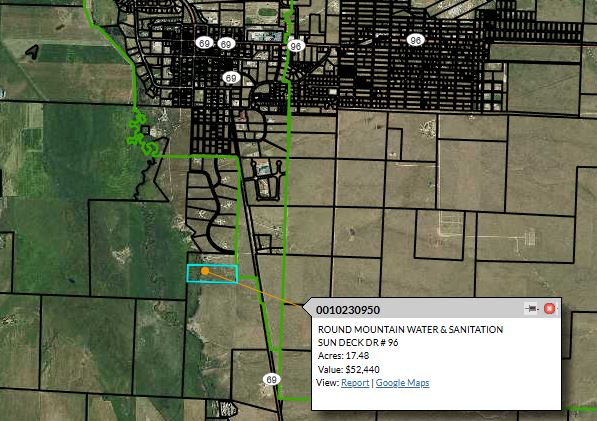On January 16, the Board of the Round Mountain Water and Sanitation District (RMWSD) held their first meeting of the new year. Business Office Manager Peggy Quint kicked off staff reporting with the announcement that the purchase of the District’s new shop property had been completed on January 7 and that the public hearing on the new rates schedule would occur in February. Field Manager Steve Koch said that he and his crew were working on the shop property to get it ready as the District’s new home base, including “getting a washer and dryer to launder work clothes.”
District Manager Dave Schneider said he had had a conference with Powell Water regarding a smaller footprint for the microalgae greenhouse for the new wastewater treatment plant. “The final application draft looks good,” he said: “I’ll probably sign that tomorrow and send it on to the engineers and CDPHE (Colorado Department of Public Health and Environment) after that.”
Schneider also reported that he is working with Denali Water Solutions on de-sludging the waste lagoons: “They (Denali) have an agreement with a local landowner for sludge disposal – we’ll probably be able to start that project in late spring.”
On the Grape Creek Reservoir project, Schneider said that he had met with the design engineer regarding plan changes and that they have the goal of a final draft of the design by the end of January. Concerning the purchase of additional property needed for the project, Schneider reported that “all the paperwork has been sent to the lawyer, we are waiting for the title, and should be able to close within the next couple of weeks.”
Under Old Business, the Board voted to approve Resolution 2025-1, establishing meeting times, places, and posting areas, and Resolution 2025-2, designating the election official and other election protocols. Quint reminded the Board that the call for election submissions would be going out in February: “And you still need to file a self-nomination form by February 28, even if you are not up for election.”
Regarding the Accessory Dwelling Unit (ADU) discussion from previous meetings, which had been prompted by Westcliffe’s passing of an ADU ordinance in the fall of 2024, Schneider said that “at the end of a lengthy discussion with the Westcliffe Planning Commission (PC), we decided we needed a rate study. Two financial specialists in Pueblo said that they would be happy to do it for us for free – they might come up next week for an initial consultation. Westcliffe leadership is going to shepherd the ADU ordinance back to the PC for reconsideration.” Schneider said that the rate study would probably take a month, “or maybe a little longer – then we can craft our rate increases.”
Board member Randy Wilhelm brought up the idea of a system development fee, which had been discussed at a recent Westcliffe PC meeting, as a way to mitigate the expense of providing water and sewer infrastructure to ADUs. “I kind of like that idea,” Schneider said: “That’s probably what I am going to recommend when we get to the revision – separate from tap fees. I would recommend that tap fees be increased for someone putting two dwellings on one property”
“And this isn’t going to apply just to Westcliffe but Silver Cliff too – it will be district-wide,” Wilhelm added.
Under new business, the Board excused Mark Dembosky absence at the December, 2024 meeting, and held a discussion regarding response time to leaks in customers’ pipes, an issue that had come up with a customer at the December meeting. Schneider quoted relevant passages from the current rules and regulations, adding, “We don’t have anything about a minimum or maximum time to respond, and I would advise against adding it – ASAP is our policy. What do we do on a weekend? If it’s a non-emergency, less than 200 gallons per hour, we can wait till Monday.”
“The system will allow customers to set an alert amount,” said Quint “if a bill goes over $200, for example.”
“Do we have the ability to turn the water off if the customer is not responding to calls, etc?” Dembosky asked. “We do,” Schneider replied.
“Is it time for saying every property owner is responsible for paying water bills, rather than tenants?” Quint asked: “The office spends way too much time trying to collect payments.” “The rules and regs state that the property owner is responsible for paying water bills,” Schneider replied.
The Board discussed changing RMWSD’s practice to accord with policy and start sending water bills to landlords rather than tenants as a matter of course, as well as how to notify property owners that this would be the case from now on. The discussion turned to the implementation of the new practice, with a “drop dead date” set at December 31, 2025, but as tenants change throughout 2025, RMWSD could start billing earlier. Quint said that if landlords want to know how much more they should be charging tenants for water service, “we can give them a 12-month (usage) history.” Board President Charles Bogle said Quint and Schneider could send out the notification letter with no further Board involvement.
– Elliot Jackson

